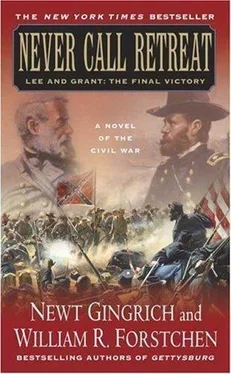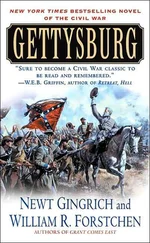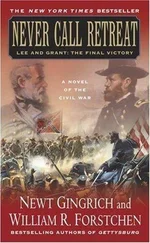Newt Gingrich - Never Call Retreat
Здесь есть возможность читать онлайн «Newt Gingrich - Never Call Retreat» весь текст электронной книги совершенно бесплатно (целиком полную версию без сокращений). В некоторых случаях можно слушать аудио, скачать через торрент в формате fb2 и присутствует краткое содержание. Жанр: Исторические приключения, на английском языке. Описание произведения, (предисловие) а так же отзывы посетителей доступны на портале библиотеки ЛибКат.
- Название:Never Call Retreat
- Автор:
- Жанр:
- Год:неизвестен
- ISBN:нет данных
- Рейтинг книги:5 / 5. Голосов: 1
-
Избранное:Добавить в избранное
- Отзывы:
-
Ваша оценка:
- 100
- 1
- 2
- 3
- 4
- 5
Never Call Retreat: краткое содержание, описание и аннотация
Предлагаем к чтению аннотацию, описание, краткое содержание или предисловие (зависит от того, что написал сам автор книги «Never Call Retreat»). Если вы не нашли необходимую информацию о книге — напишите в комментариях, мы постараемся отыскать её.
Never Call Retreat — читать онлайн бесплатно полную книгу (весь текст) целиком
Ниже представлен текст книги, разбитый по страницам. Система сохранения места последней прочитанной страницы, позволяет с удобством читать онлайн бесплатно книгу «Never Call Retreat», без необходимости каждый раз заново искать на чём Вы остановились. Поставьте закладку, и сможете в любой момент перейти на страницу, на которой закончили чтение.
Интервал:
Закладка:
These men had marched over a hundred miles in the past week and fought a brutal three-day running battle in killing heat, and it showed. The usual banter of a victorious army on the march was gone; the high spirits that should have echoed after their overwhelming victories over the Army of the Potomac were not showing this day. Exhaustion had overwhelmed exhilaration.
He rode in silence, lost in thought. Walter Taylor, his aide-de-camp, the staff, even the secretary of state, Judah Benjamin, sensing he wished to ride alone to think, trailed a respectful distance behind him.
After the smashing defeat of Sickles he expected Grant to wait, or perhaps even to start transferring his army by train and boat down to Washington, there to assume a defensive posture through the fall and winter.
But to take an aggressive path? To cross the river and move south, perhaps straight at him. No, he had not expected that. After every defeat dealt the Union Army over the last year, his opponents had always retreated, regrouped, and waited several months before venturing another blow.
It was like facing an opponent in chess. The traditional opening of a king or queen's pawn is expected, but then, instead, the man across the table puts his knight out first. That was usually the move of a fool… or could it be that of a master or someone who sensed or planned something Lee could not yet ascertain.
Who was Grant? In that tight-knit cadre of old comrades from West Point, the old professional army of the frontier, of Mexico, or garrison duty in East Coast fortifications, Grant was one man he could not remember. He knew the man had served in Mexico and gained distinction there for personal bravery and leadership, but as an army commander? He had beaten Beauregard at Shiloh, captured an entire army at Fort Donelson and Vicksburg. He was used to victory… perhaps that could be turned against him.
There were the rumors as well about the man's drinking, but then again, the army had always been a hard-drinking lot. In the case of Grant, the few who knew him said it had been brought on by a fit of melancholia when stationed out on the West Coast, separated from his wife and children.
Longstreet, who did know him, dismissed the drinking, saying that it was a demon his old friend would have overcome, especially when he had returned to the army and given the responsibility of command.
All the others he had faced so far, McClellan, the fool Pope, the slow-moving Burnside, the hard-driving but morally weak Hooker, even Meade and Sickles, he could read them, and he could read as well the thinking, the rhythm, the mentality of the Army of the Potomac… reft by internal dissent and political maneuverings, hampered by even more political maneuverings in Washington.
But he was no longer facing the Army of the Potomac, and even in Washington he sensed a change. Halleck was out, and just this morning Judah Benjamin had suggested that perhaps Stanton's days were numbered as well. A staff officer of Sickles's, a prisoner, had bitterly complained that his general had moved without coordination with Grant, and everyone at Sickles's headquarters knew that Stanton had sent out contradictory orders for which "someone would pay."
And Grant's corps commanders-Ord, McPherson, Banks, Burnside. He knew the mettle of Burnside, knew the fumbling reputation of Banks, who survived due to political influence. Word on McPherson was his men worshipped him and declared him to be the best corps commander in any army.
And he knew him as well, as superintendent at West Point. The memory of McPherson caused him to smile. McPherson had risen to become the top-ranking officer of cadets. He was a moral man, honest, open-handed, respected by all. John Bell Hood had been his roommate and he loved him like a brother.
Of all the potential opponents this war had forced him to confront, James Birdseye McPherson was the one opponent he wished he did not have to face. There was a deep bond of affection, that of a mentor for a beloved student.
Now I will have to face him, and turn all that was good between us into a tool, a weapon to defeat him in battle.
Edward Ord, new to his rank of corps commander, was a man who supposedly loved a good head-on fight, a man like Hood.
And their troops. These Union soldiers from the West were used to victory; they were used to tough fighting in the scorching heat and bayous of Mississippi, the tangled forests of Tennessee, the swamps of Louisiana. They were fighters-and filled with a belief in themselves. In battle, such belief is often what tips the scale between victory and defeat. Though tough soldiers, the men of the Army of the Potomac seemed to carry an innate sense that defeat would always be their ultimate fate, and that had come true at Union Mills and Gunpowder River.
He wished he had another month, time to evaluate, to maneuver and observe Grant, to spar with him to get a taste of him, before moving in for the kill.
The pasture ahead dropped down into a glen and he welcomed the momentary pause as he loosened Traveler's reins and gave his companion a chance to drink in the shade of the willows lining the shallow creek. There the air was damp and rich, the brook rippling and sparkling with reflected light.
To his left a battery of guns was clattering over a rough-hewn wooden bridge, troops left the road to wade across the knee-deep stream. A few men playfully splashed each other. Sergeants called for canteens, handing them off to details to fill while the column pushed on, the water bearers enjoying their work for a few minutes, some tossing off packs, haversacks, and cartridge boxes and collapsing into the water to cool off, before picking up their gear and filled canteens to double-time back into the column.
More than a few men lay in the shadow of the trees, barefoot, soaking their feet, one of the men gingerly wrapping torn strips of cloth around his bleeding and blistered heels. At the sight of the general some came to attention. A provost guard watching the group nervously declared the men" exhausted troops from a Virginia regiment, had been given passes to fall out of the march for a few minutes but would catch up to their unit.
Lee said nothing. He nodded and then, gathering Traveler's reins, trotted across the stream and up the bank through the high river grass, birds kicking up around him.
Old Thomas Jackson would never have stood for the boys falling out like that. He'd have shouted for them to get back in the ranks and march till they dropped, but today was not the day for that. Reports from the previous week's march were that hundreds of men, listed as missing in action, had actually collapsed and died in the forced marching in hundred-degree heat. He therefore had sent word down that those unable to keep up today were to be treated leniently.
As he came up out of the streambed he saw a low church steeple, a small village of a few dozen homes, the windows of some showing limp Confederate flags, others shuttered and closed. Longstreet's headquarters flag fluttered out in a gentle breeze near the church, an awning set up in front of it, with staff gathering around.
Uniforms showed gold braid. He saw Stuart still astride his horse, leaning over, talking with Beauregard. Hood, sitting on a chair under the awning, head back, was obviously asleep. Seeing him coming up, men began to stir, staff moving about, setting chairs around a table.
A corporal offered to take Traveler's reins, and Lee with a sigh dismounted. On stiff legs he walked toward the gathering, returning the salutes of those waiting for him.
Someone nudged Hood, who looked around sleepily and then stood up. Stuart dismounted, taking off his plumed hat as he stepped under the awning.
These were his old warriors and Providence had been kind in this fight, sparing all of them yet again. Not a division commander had been lost in this last fight, thank God, though Pickett had lost three of his five brigade commanders and the others were wounded. He caught a glimpse of Pickett standing nervously to one side, the man breaking eye contact when Lee looked at him for a moment.
Читать дальшеИнтервал:
Закладка:
Похожие книги на «Never Call Retreat»
Представляем Вашему вниманию похожие книги на «Never Call Retreat» списком для выбора. Мы отобрали схожую по названию и смыслу литературу в надежде предоставить читателям больше вариантов отыскать новые, интересные, ещё непрочитанные произведения.
Обсуждение, отзывы о книге «Never Call Retreat» и просто собственные мнения читателей. Оставьте ваши комментарии, напишите, что Вы думаете о произведении, его смысле или главных героях. Укажите что конкретно понравилось, а что нет, и почему Вы так считаете.












